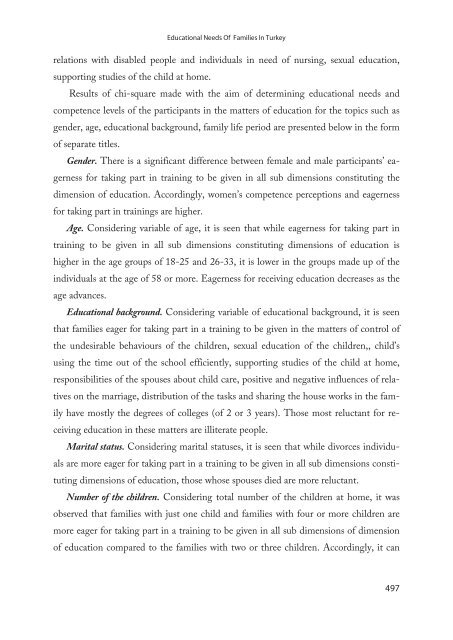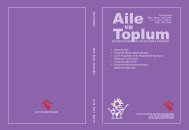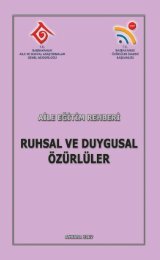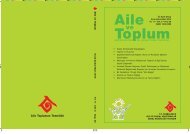- Page 3 and 4:
T.C. BAŞBAKANLIK AİLE VE SOSYAL A
- Page 5:
ÖNSÖZ 20. yüzyılın endüstrile
- Page 9:
TEŞEKKÜR Türkiye’de Ailelerin
- Page 12 and 13:
2.7. Ailelerin Eğitim İhtiyaçlar
- Page 14 and 15:
YEDİNCİ BÖLÜM STUDY ON EDUCATIO
- Page 16 and 17:
Tablo 29. Hukuk Boyutunda Aile Bire
- Page 19:
KISALTMALAR AÇEP : Anne Çocuk Eğ
- Page 22 and 23:
2 Özet bilgi edinme kaynakları ol
- Page 24 and 25:
4 Özet Meslek değişkenine göre
- Page 26 and 27:
6 Özet Medya boyutunda çeşitli f
- Page 28 and 29:
8 Türkiye’de Ailelerin Eğitim
- Page 30 and 31:
10 Türkiye’de Ailelerin Eğitim
- Page 32 and 33:
12 • Koruyucu aile, • Çocuk ko
- Page 34 and 35:
14 Türkiye’de Ailelerin Eğitim
- Page 36 and 37:
16 Türkiye’de Ailelerin Eğitim
- Page 38 and 39:
18 6. Medeni hal 7. (Evli ise) Evli
- Page 40 and 41:
20 Türkiye’de Ailelerin Eğitim
- Page 42 and 43:
22 1.6. Varsayımlar Türkiye’de
- Page 44 and 45:
24 Kavramsal Çerçeve
- Page 46 and 47:
26 Kavramsal Çerçeve ya gelen ço
- Page 48 and 49:
28 Kavramsal Çerçeve ri ortaya ko
- Page 50 and 51:
30 Kavramsal Çerçeve şimin cemaa
- Page 52 and 53:
32 Kavramsal Çerçeve toplumuna ge
- Page 54 and 55:
34 Kavramsal Çerçeve 2) İçe yö
- Page 56 and 57:
36 Kavramsal Çerçeve 4. Ailedeki
- Page 58 and 59:
38 Kavramsal Çerçeve Anne, baba,
- Page 60 and 61:
40 Kavramsal Çerçeve � Bu tür
- Page 62 and 63:
42 Kavramsal Çerçeve grubunda ço
- Page 64 and 65:
44 Kavramsal Çerçeve olanların
- Page 66 and 67:
46 Kavramsal Çerçeve yüksek puan
- Page 68 and 69:
48 Kavramsal Çerçeve Kırış (19
- Page 70 and 71:
50 Kavramsal Çerçeve için kendi
- Page 72 and 73:
52 � Ölçüte dayalı ihtiyaçla
- Page 74 and 75:
54 Kavramsal Çerçeve eğitimi, ai
- Page 76 and 77:
56 Kavramsal Çerçeve Aile bir top
- Page 78 and 79:
58 Kavramsal Çerçeve • Eğitim
- Page 80 and 81:
60 Kavramsal Çerçeve dır (Becker
- Page 82 and 83:
62 Kavramsal Çerçeve örneğin t
- Page 84 and 85:
64 Kavramsal Çerçeve g. Deprem, s
- Page 86 and 87:
66 Yöntem
- Page 88 and 89:
68 Yöntem araştırmalarda nicel v
- Page 90 and 91:
70 Yöntem rinden elde edilecek bul
- Page 92 and 93:
72 Yöntem lakat çalışmasının
- Page 94 and 95:
74 Yöntem 1) Soruların kolay anla
- Page 96 and 97:
76 Yöntem cevaplamakta güçlük
- Page 98 and 99:
Van, 78 Yöntem 2- Sakarya, Bolu, D
- Page 100 and 101:
80 Yöntem Tablo 4. TÜİK Örnekle
- Page 102 and 103:
82 Yöntem Ekteki tablolarda TÜİK
- Page 104 and 105:
84 Yöntem Delphi uygulamasının
- Page 106 and 107:
86 Yöntem
- Page 108 and 109:
88 Bulgular ve Tartışma
- Page 110 and 111:
90 Bulgular ve Tartışma Tablo 7.
- Page 112 and 113:
92 Bulgular ve Tartışma Tablo 11.
- Page 114 and 115:
94 Bulgular ve Tartışma Tablo 18.
- Page 116 and 117:
96 Bulgular ve Tartışma Tablo 23.
- Page 118 and 119:
98 Bulgular ve Tartışma Tablo 26.
- Page 120 and 121:
100 Bulgular ve Tartışma lerin or
- Page 122 and 123:
102 Bulgular ve Tartışma katılma
- Page 124 and 125:
104 Bulgular ve Tartışma nomik ya
- Page 126 and 127:
106 Bulgular ve Tartışma şük ol
- Page 128 and 129:
108 Bulgular ve Tartışma nişanl
- Page 130 and 131:
110 Bulgular ve Tartışma üzeri e
- Page 132 and 133:
112 Bulgular ve Tartışma değişk
- Page 134 and 135:
114 Bulgular ve Tartışma anlamlı
- Page 136 and 137:
116 Bulgular ve Tartışma eğitime
- Page 138 and 139:
118 Bulgular ve Tartışma 33’ün
- Page 140 and 141:
120 Bulgular ve Tartışma şiddeti
- Page 142 and 143:
122 Bulgular ve Tartışma bölüm
- Page 144 and 145:
124 Bulgular ve Tartışma Hukuk Bo
- Page 146 and 147:
126 Bulgular ve Tartışma yazar ol
- Page 148 and 149:
128 Bulgular ve Tartışma Aile üy
- Page 150 and 151:
130 Bulgular ve Tartışma olan kat
- Page 152 and 153:
132 Bulgular ve Tartışma ların k
- Page 154 and 155:
134 Bulgular ve Tartışma bakıma
- Page 156 and 157:
136 Bulgular ve Tartışma sına il
- Page 158 and 159:
138 Bulgular ve Tartışma Tablo 30
- Page 160 and 161:
140 Bulgular ve Tartışma kendiler
- Page 162 and 163:
142 Bulgular ve Tartışma lojik so
- Page 164 and 165:
144 Bulgular ve Tartışma Yaşlı
- Page 166 and 167:
146 Bulgular ve Tartışma nularda
- Page 168 and 169:
148 Bulgular ve Tartışma sağlı
- Page 170 and 171:
150 Bulgular ve Tartışma Sağlık
- Page 172 and 173:
152 Bulgular ve Tartışma ailelerd
- Page 174 and 175:
154 Bulgular ve Tartışma ki diğe
- Page 176 and 177:
156 Bulgular ve Tartışma fazla e
- Page 178 and 179:
158 Bulgular ve Tartışma Aile üy
- Page 180 and 181:
160 Bulgular ve Tartışma Tablo 32
- Page 182 and 183:
162 Bulgular ve Tartışma Çocukla
- Page 184 and 185:
164 Bulgular ve Tartışma ruhi iht
- Page 186 and 187:
166 Bulgular ve Tartışma Çocuğu
- Page 188 and 189:
168 Bulgular ve Tartışma tarafın
- Page 190 and 191:
170 Bulgular ve Tartışma ğılım
- Page 192 and 193:
172 Bulgular ve Tartışma lılaşm
- Page 194 and 195:
174 Bulgular ve Tartışma rabalar
- Page 196 and 197:
176 Bulgular ve Tartışma göre, k
- Page 198 and 199:
178 Bulgular ve Tartışma mada cin
- Page 200 and 201:
180 Bulgular ve Tartışma görev d
- Page 202 and 203:
182 Bulgular ve Tartışma İkamet
- Page 204 and 205:
184 Bulgular ve Tartışma Bu bulgu
- Page 206 and 207:
186 Bulgular ve Tartışma Tablo 34
- Page 208 and 209:
188 Bulgular ve Tartışma Aile üy
- Page 210 and 211:
190 Bulgular ve Tartışma ise % 30
- Page 212 and 213:
192 Bulgular ve Tartışma yaşlar
- Page 214 and 215:
194 Bulgular ve Tartışma ifade ed
- Page 216 and 217:
196 Bulgular ve Tartışma mensup k
- Page 218 and 219:
198 Bulgular ve Tartışma (çocukl
- Page 220 and 221:
200 Bulgular ve Tartışma me katı
- Page 222 and 223:
202 Bulgular ve Tartışma da diğe
- Page 224 and 225:
204 Bulgular ve Tartışma lımcıl
- Page 226 and 227:
206 Bulgular ve Tartışma dinleme
- Page 228 and 229:
208 Bulgular ve Tartışma İletiş
- Page 230 and 231:
210 Bulgular ve Tartışma Anadolu
- Page 232 and 233:
212 Bulgular ve Tartışma Tablo 37
- Page 234 and 235:
214 Bulgular ve Tartışma Aile üy
- Page 236 and 237:
216 Bulgular ve Tartışma Medya Bo
- Page 238 and 239:
218 Bulgular ve Tartışma medya bo
- Page 240 and 241:
220 Bulgular ve Tartışma bilme ko
- Page 242 and 243:
222 Bulgular ve Tartışma verilece
- Page 244 and 245:
224 Bulgular ve Tartışma Medya Bo
- Page 246 and 247:
226 Bulgular ve Tartışma baş ede
- Page 248 and 249:
228 Bulgular ve Tartışma Katılı
- Page 250 and 251:
230 Bulgular ve Tartışma doğu An
- Page 252 and 253:
232 Bulgular ve Tartışma Eğitim
- Page 254 and 255:
234 Bulgular ve Tartışma NİTEL A
- Page 256 and 257:
236 Bulgular ve Tartışma Tablo 45
- Page 258 and 259:
238 Bulgular ve Tartışma (7) par
- Page 260 and 261:
240 Bulgular ve Tartışma insanlar
- Page 262 and 263:
242 Bulgular ve Tartışma celikle
- Page 264 and 265:
244 Bulgular ve Tartışma iradesin
- Page 266 and 267:
246 Bulgular ve Tartışma dan kaza
- Page 268 and 269:
248 Bulgular ve Tartışma kendiler
- Page 270 and 271:
250 Bulgular ve Tartışma Görüld
- Page 272 and 273:
252 Bulgular ve Tartışma yapılab
- Page 274 and 275:
254 Bulgular ve Tartışma Görüş
- Page 276 and 277:
256 Bulgular ve Tartışma Bu neden
- Page 278 and 279:
258 Bulgular ve Tartışma enerji v
- Page 280 and 281:
260 Bulgular ve Tartışma kandırm
- Page 282 and 283:
262 Bulgular ve Tartışma Analizle
- Page 284 and 285:
264 Bulgular ve Tartışma nın üs
- Page 286 and 287:
266 Bulgular ve Tartışma da yarar
- Page 288 and 289:
268 Bulgular ve Tartışma ekonomik
- Page 290 and 291:
270 Bulgular ve Tartışma HUKUK BO
- Page 292 and 293:
272 Bulgular ve Tartışma diyerek
- Page 294 and 295:
274 Bulgular ve Tartışma Aile iç
- Page 296 and 297:
276 Bulgular ve Tartışma hatalı
- Page 298 and 299:
278 Bulgular ve Tartışma sigortas
- Page 300 and 301:
280 Bulgular ve Tartışma konularl
- Page 302 and 303:
282 Bulgular ve Tartışma diyerek
- Page 304 and 305:
284 Bulgular ve Tartışma SAĞLIK
- Page 306 and 307:
286 Bulgular ve Tartışma Beslenme
- Page 308 and 309:
288 Bulgular ve Tartışma Gıda ma
- Page 310 and 311:
290 Bulgular ve Tartışma sakatlı
- Page 312 and 313:
292 Bulgular ve Tartışma Tablo 50
- Page 314 and 315:
294 Bulgular ve Tartışma Aile eğ
- Page 316 and 317:
296 Bulgular ve Tartışma P, Ü, 3
- Page 318 and 319:
298 Bulgular ve Tartışma receğin
- Page 320 and 321:
300 Bulgular ve Tartışma dilmedi
- Page 322 and 323:
302 Bulgular ve Tartışma müyorum
- Page 324 and 325:
304 Bulgular ve Tartışma lemedik
- Page 326 and 327:
306 Bulgular ve Tartışma yumları
- Page 328 and 329:
308 Bulgular ve Tartışma etkinlik
- Page 330 and 331:
310 Bulgular ve Tartışma oluştur
- Page 332 and 333:
312 Bulgular ve Tartışma görüş
- Page 334 and 335:
314 Bulgular ve Tartışma şeklind
- Page 336 and 337:
316 Bulgular ve Tartışma yani ann
- Page 338 and 339:
318 Bulgular ve Tartışma kek olsu
- Page 340 and 341:
320 Bulgular ve Tartışma “Hoca,
- Page 342 and 343:
322 Bulgular ve Tartışma A, MM,
- Page 344 and 345:
324 Bulgular ve Tartışma hayatta
- Page 346 and 347:
326 Bulgular ve Tartışma dilerini
- Page 348 and 349:
328 Bulgular ve Tartışma önemli
- Page 350 and 351:
330 Bulgular ve Tartışma olarak i
- Page 352 and 353:
332 Bulgular ve Tartışma K, B, O]
- Page 354 and 355:
334 Bulgular ve Tartışma Nişanl
- Page 356 and 357:
336 Bulgular ve Tartışma Tablo 51
- Page 358 and 359:
338 Bulgular ve Tartışma oluştur
- Page 360 and 361:
340 Bulgular ve Tartışma Yani duy
- Page 362 and 363:
342 Bulgular ve Tartışma Bu ifade
- Page 364 and 365:
344 Bulgular ve Tartışma olarak d
- Page 366 and 367:
346 Bulgular ve Tartışma den yeti
- Page 368 and 369:
348 Bulgular ve Tartışma kadar ge
- Page 370 and 371:
350 Bulgular ve Tartışma P, Ü, 4
- Page 372 and 373:
352 Bulgular ve Tartışma “Çöz
- Page 374 and 375:
354 Bulgular ve Tartışma mektedir
- Page 376 and 377:
356 Bulgular ve Tartışma Acaba ta
- Page 378 and 379:
358 Bulgular ve Tartışma Tablo 52
- Page 380 and 381:
360 Bulgular ve Tartışma duktan s
- Page 382 and 383:
362 Bulgular ve Tartışma [ODAK, 7
- Page 384 and 385:
364 Bulgular ve Tartışma görür
- Page 386 and 387:
366 Bulgular ve Tartışma evlilik
- Page 388 and 389:
368 Bulgular ve Tartışma Çocukla
- Page 390 and 391:
370 Bulgular ve Tartışma Her ne k
- Page 392 and 393:
372 Bulgular ve Tartışma edebilme
- Page 394 and 395:
374 Bulgular ve Tartışma
- Page 396 and 397:
376 Sonuç ve Öneriler
- Page 398 and 399:
378 Sonuç ve Öneriler Ekonomi boy
- Page 400 and 401:
380 Sonuç ve Öneriler Farklı mes
- Page 402 and 403:
382 Sonuç ve Öneriler Aile tipi d
- Page 404 and 405:
384 Sonuç ve Öneriler tadır. Bü
- Page 406 and 407:
386 Sonuç ve Öneriler ilgili kodl
- Page 408 and 409:
388 Sonuç ve Öneriler liği sorun
- Page 410 and 411:
390 Sonuç ve Öneriler camaların
- Page 412 and 413:
392 Sonuç ve Öneriler Aile üyele
- Page 414 and 415:
394 Sonuç ve Öneriler Aile üyele
- Page 416 and 417:
396 Sonuç ve Öneriler metlerinden
- Page 418 and 419:
398 Sonuç ve Öneriler yaptıklar
- Page 420 and 421:
400 Sonuç ve Öneriler özellikle
- Page 422 and 423:
402 Sonuç ve Öneriler (1) iletiş
- Page 424 and 425:
404 Sonuç ve Öneriler Aile üyele
- Page 426 and 427:
406 Sonuç ve Öneriler Kent ve kı
- Page 428 and 429:
408 Sonuç ve Öneriler Medyanın e
- Page 430 and 431:
410 Sonuç ve Öneriler Yaş deği
- Page 432 and 433:
412 Sonuç ve Öneriler Dini değer
- Page 434 and 435:
414 Sonuç ve Öneriler Dini değer
- Page 436 and 437:
416 Sonuç ve Öneriler temel insan
- Page 438 and 439:
418 Sonuç ve Öneriler Araştırma
- Page 440 and 441:
420 Sonuç ve Öneriler yönelik ge
- Page 442 and 443:
422 Sonuç ve Öneriler • Aileyi
- Page 444 and 445:
424 Sonuç ve Öneriler
- Page 446 and 447:
426 Kaynakça ve Ekler
- Page 448 and 449:
428 Kaynakça ve Ekler ASAGEM. (200
- Page 450 and 451:
430 Kaynakça ve Ekler Elden, M. ve
- Page 452 and 453:
432 Kaynakça ve Ekler Myers, R. (1
- Page 454 and 455:
434 Kaynakça ve Ekler Yıldırım,
- Page 456 and 457:
436 Kaynakça ve Ekler 8 Yaşadığ
- Page 458 and 459:
21. 22. 438 Kaynakça ve Ekler etme
- Page 460 and 461:
63. 440 Kaynakça ve Ekler Aileleri
- Page 462 and 463:
442 Kaynakça ve Ekler İLETİŞİM
- Page 464 and 465:
444 Kaynakça ve Ekler 8.1. Hayır
- Page 466 and 467: 446 Kaynakça ve Ekler 16.3. Yenile
- Page 468 and 469: 448 Kaynakça ve Ekler 24. Anne bab
- Page 470 and 471: 450 Kaynakça ve Ekler İLETİŞİM
- Page 472 and 473: 452 Kaynakça ve Ekler lış yönle
- Page 474 and 475: 454 Kaynakça ve Ekler EK - 4 EVLİ
- Page 476 and 477: 456 Kaynakça ve Ekler 10. Mutlu bi
- Page 478 and 479: 458 Kaynakça ve Ekler 18.1. Aile b
- Page 480 and 481: 460 Kaynakça ve Ekler [İPUCU] Gü
- Page 482 and 483: 462 Kaynakça ve Ekler 1. Tanışma
- Page 484 and 485: 464 Kaynakça ve Ekler
- Page 486 and 487: 466 Educational Needs Of Families I
- Page 488 and 489: 468 Educational Needs Of Families I
- Page 490 and 491: 470 Educational Needs Of Families I
- Page 492 and 493: 472 Educational Needs Of Families I
- Page 494 and 495: 474 Educational Needs Of Families I
- Page 496 and 497: 476 Educational Needs Of Families I
- Page 498 and 499: 478 Educational Needs Of Families I
- Page 500 and 501: 480 Educational Needs Of Families I
- Page 502 and 503: 482 Educational Needs Of Families I
- Page 504 and 505: 484 Educational Needs Of Families I
- Page 506 and 507: 486 7.3.2. Family Law Educational N
- Page 508 and 509: 488 Educational Needs Of Families I
- Page 510 and 511: 490 Educational Needs Of Families I
- Page 512 and 513: 492 Educational Needs Of Families I
- Page 514 and 515: 494 Educational Needs Of Families I
- Page 518 and 519: 498 Educational Needs Of Families I
- Page 520 and 521: 500 Educational Needs Of Families I
- Page 522 and 523: 502 Educational Needs Of Families I
- Page 524 and 525: 504 Educational Needs Of Families I
- Page 526 and 527: 506 Educational Needs Of Families I
- Page 528 and 529: 508 7.3.6. Media Educational Needs
- Page 530 and 531: 510 Educational Needs Of Families I
- Page 532 and 533: 512 Educational Needs Of Families I
- Page 534 and 535: 514 Educational Needs Of Families I
- Page 536 and 537: 516 Educational Needs Of Families I
- Page 538: 518 Educational Needs Of Families I






